DAVE'S DIARY - 3 MAY 2016 - DAVE COBB CD REVIEW
2016 CD REVIEW
DAVE COBB
SOUTHERN FAMILY (LOW COUNTRY SOUND-WARNER)
FROM GRANDMA'S GARDEN TO MAMA'S TABLE - SOUTHEN FAMILY COOKING
“Grandma's garden, it grew up strong/ 'cause she weeded out whatever could go wrong/ she'd say, the straight & narrow is toughest row to hoe/ in the garden of the Father, now she's home/ grandma's love is what made Grandma's garden grow.” - Grandma's Garden - Skip Ewing-Donny Keys.
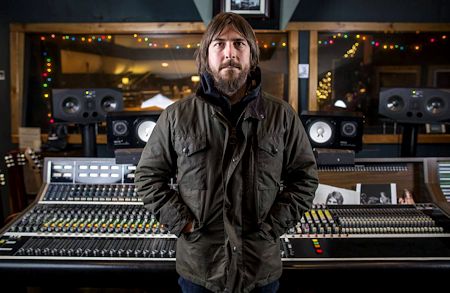 |
When nouveau roots country producer Dave Cobb decided to release a compilation of songs by his favourite artists he ensured he had the raw ingredients - God, mama, grandma, grandpa and a frequent hit by late centenarian singing actor and Louisiana governor Jimmie Davis.
That's right southern Baptist Jimmie Davis - one of 11 children and the 47th Louisiana governor who lived until he was 101.
Davis was still recording in his nineties and released 40 albums in a career that embraced acting in six movies including an Ozzie and Harriet film.
The Governor wrote There's A New Moon Over My Shoulder - a No 1 hit when Jimmie was governor in 1945.
But Cobb appropriately reached back further to 1940 for oft recorded classic You Are My Sunshine.
Most appropriate - because the singers here are Cobb studio client and prolific Grammy winner and Kentucky coal-miner's son Chris Stapleton and his singing spouse Morgane.
Stapleton - former singer-guitarist-songwriter for bluegrass aces the Steeldrivers - had to wait until he was 37 for huge selling breakthrough album Traveller.
Yes, the same age as the Governor when he had his first hit Nobody's Darling But Mine in 1937.
The Stapletons' vibrant version of You Are My Sunshine was final song recorded here, shortly after their CMA triumph.
Southern Family is designed as a conceptual album about life below the Mason-Dixon Line
OK that's a little history.
What else do we have here - well, the disc kicks off with Civil Wars co-founder John Paul White original Simple Song - inspired by his grandmother.
It segues into Alabama born recent Aussie tourist Jason Isbell's grand-paternal blue collar anthem God Is A Working Man, replete with the obligatory rattlesnakes dancing with saints and sinners.
Cobb's cousin Brent performs another original Down Home and Texan Miranda Lambert revives another gospel classic Sweet By And By.
Another highlight is Learning by Miranda's new beau - Alabama singer-songwriter Anderson East.
Miranda divorced Oklahoma singing spouse Blake Shelton last year so it's fitting East's riveting performance ignites the song, also inspired by divorce - his parents.
Georgian Zac Brown and Alabama outlaw Jamey Johnson reinforce importance of senior matriarchs in Cobb's southern family by serving the main course in the middle of this delicious disc.
Needless to say Brown's rustic delivery of homespun homily Grandma's Garden segues into Johnson's earthy treatment of Mama's Table that also pays importance of Granny - maybe worthy of a Grammy too.
TABLE FOR TWO PLUS
It was the centre of the best times I remember/ sometimes the only thing that brought us all together/ grandma passed it down when I was in a cradle/ it's in my kitchen now but it's still my mama's table/ it's where my brother and I played games/ I just knew he'd gone insane the day/ he carved his name in mama's table.” - Mama's Table - Jamey Johnson-George Teren.
But grandpa has not been forgotten in another original.
Holly Williams - grand-daughter of Hank Williams and daughter of Hank Jr (old Bocephus) - performs her autobiographical road and reality tune Settle Down .
It's just before another late bloomer Brandy Clark delivers perhaps the disc highlight I Cried - a haunting homage to a widow left behind by an Octogenarian who also greets God with his children, grandchildren and great grandchildren all in mourning.
Brandy is a hard act to follow but Shooter Jennings - son of Jessi Colter and the late Waylon Jennings - relishes with Can You Come Over, sung from the viewpoint of a child of a war veteran and a fractured family.
The fitting finale is the mournful The Way Home - Black Crowes co-founder Rich Robinson's gospel original, reminiscent of a chain gang field anthem.
Southern Family was recorded in the historic RCA Studio A in Nashville for Cobb's Low Country Sound label and available here on Warner Music .
Built in 1965 by producer-guitarist-hit writer Chet Atkins, the studio helped establish the small section of the city, which now houses a profusion of record-label offices, music publishing houses and other studios, known as Music Row .
Cobb, now 41, took over the lease for Studio A on April 1, sat beside a statue of Nipper, the old RCA mascot, for the interviews below.
CIVIL WARS ENTRÉE
“You're gonna die, you're gonna die/ younger eyes are gonna cry/ by morning within your arms/ ain't gonna lose sleep/ when you're safe from harm/ I'll love you hard/ I'll love you long/ sung every to this simple song.” - Simple Song - John Paul White.
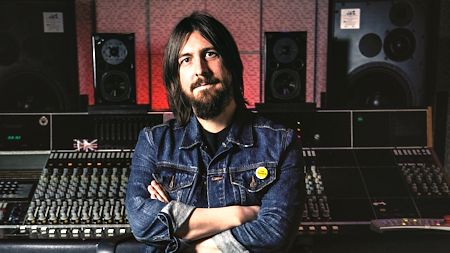 |
Cobb explained why he chose his entrée song.
“To me, there's several tracks that stand out, and I think everybody stepped up to the plate,” Cobb revealed.
“There isn't one that I would speak to over the others but there are definitely songs that - John Paul White's Simple Song , you don't have to like country music to like that song He wrote the song as his grandmother, which I thought was really telling and really being transparent and digging really deep. It's a beautiful song, and I love the melody of the song.
“His grandfather was his life. His grandfather told him how to load a pipe, his grandfather taught him how to fish. When he died, White couldn't understand why everyone was crying at the funeral, except his grandmother.
“He didn't understand that for many years, and later on he finally found out his grandfather used to stay out all night and was a different person than he thought. His grandmother said that when his grandfather finally died, that she cried for him when she was alive and she didn't have to cry anymore.”
“It was really the first track we cut for the album. It may stand out in that way, but there are other songs that are complete standouts: Brandy Clark singing I Cried live with us - and she's pouring her heart out; you can hear it in her vocals - and Morgane Stapleton singing You Are My Sunshine which is a song that everybody grows up with.
“When they told me about that song, I was like, “ You Are My Sunshine ? Really?” You know. Out of all these songs, you guys are doing You Are My Sunshine ? Sometimes I moonlight with the Stapletons on guitar, and we went onstage, and before we went on, they were like, “We're doing Sunshine , it's in G, follow along.”
So I go up there, and they start singing it like the way they sing it on the record, and it just knocked me out - I mean, so beautiful. I had to apologise afterwards.
ANDERSON EAST HEADS SOUTH
“I remember growing up/ riding shotgun in my daddy's truck/ he let me take the wheel every now and then/ and I was learning - to be a man/ we drive down to the Wilsons pond/ with rods and reels and little George Jones/ and he made a cast and let me pull them in/ and I was learning - learning to be a man.” - Learning - Anderson East.
Cobb is a huge fan of Anderson East whose third album Delilah was the first on his Low Country Sounds label.
“I would have had him on the album whether he was signed to my label or not; he's one of my super-close friends, and I love his voice, I love his singing” Cobb added.
“His track's about his father and his mother going through divorce and his father kind of guiding the way through all the hard times he went through.
 |
“I didn't want the record to be one dimensional, so I'm happy that he wrote that song and it's got that kind of feel, because the record is Southern Family , and Southern music is diverse. It's not just country, not just bluegrass, it's all of it: It's rock ‘n' roll, it's soul, it's blues, and I'm glad he brought that element - the kind of soul element - to the foreground. He's just really going for it and pouring it out, and at the end of it, I don't even know how he talked after he sang. It's on fire that track. I mean, I love working with new artists. I think it's really great to work with somebody and see them get better and better their craft and to see them succeed. It's the most rewarding thing ever. I love meeting new artists, I really do. I think that's the most fun, in a lot of ways. |
"I think the only common tie I try to do when I make records is probably the honesty in the songs or the honesty in the artist. I want it to always be about them and not about me. That's probably the only signature I have, to try and avoid imprinting a sound on everybody. I want to hear them, I want to hear their voice and their sound."
So how did Cobb decide who he wanted to work with?
“To me, it's all about a voice, always about that kind of intangible thing. When you hear them sing - I'm into record making, and I've had this epiphany recently: I want to make records that draw you to them as opposed to pushing you away. There are a lot of records that are so bombastic and have so much going on and are so over the top, it feels great immediately, but it wears on you.
“I don't know what it is; it's a complete intangible, and there's no way to scientifically explain it, but when I heard Chris Stapleton sing the first time and, like, my god, you know that it's good, you know that it's right. Same thing with Anderson East or Sturgill Simpson. You hear these people, and they have such distinct voices, and I think that's what I'm attracted to the most. And I know them, they have great personalities as well.
“I try not to have a sound; I definitely try to even not have a genre, you know? I think the only common tie I try to do when I make records is probably the honesty in the songs or the honesty in the artist. I want it to always be about them and not about me. That's probably the only signature I have, to try and avoid imprinting a sound on everybody. I want to hear them, I want to hear their voice and their sound.”
COBB AND CO EMBRYO
Cobb expanded on the inspiration of country roots pioneers for him resurrecting the famous RCA studio and younger artists keeping the flame burning.
“The first time everybody walks in here, it takes a second to acclimate,” Cobb revealed of Studio A .
“I love old Waylon Jennings records. They were recorded right here, literally, right here! Dolly Parton recorded Jolene over there.”
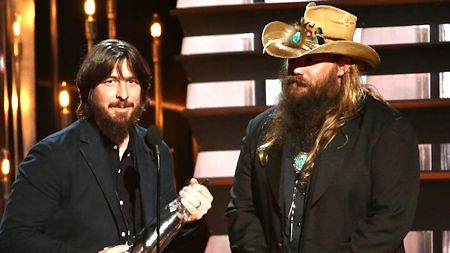 |
Cobb's passion for country music history is reflected through artists he produced recently, including Chris Stapleton - whose Grammy-winning album Traveller was cut there - Sturgill Simpson, Jason Isbell and Jamey Johnson.
He is also producing cousin Brent's solo album.
Before Stapleton's success his most commercial project was A Thousand Horses Southernality album.
Their song Smoke - featured on Nu Country TV - is his only No. 1 single.
Cobb's outsider insurgency bucked the Music City system, dragging roots country back into the genre's mainstream.
“I just want to preserve the original spirit of this place and continue the story,” Cobb explained.
“It's a really powerful time in Nashville right now. I wanted to make a time capsule of where we're at.”
Cobb's cavalry echoed a similar surge in the late 1960s and 1970s when Waylon Jennings, Willie Nelson, Kris Kristofferson, Billy Joe Shaver, Tompall Glaser, David Allan Coe and Ray Wylie Hubbard injected a hard rock edge into country's coiffed confines.
The outlaw movement - with offshoots in Texas - broadened the genre appeal and morphed into Americana and alt-country about 25 years ago with Steve Earle, Lucinda Williams, Ryan Adams, Buddy Miller, Jim Lauderdale, Kacey Musgraves and others driving the train.
“Some people walk around whining, ‘country radio is a place where difference goes to die' and it's correct,” said Luke Lewis, former chief executive of Universal Music Nashville and founder of Lost Highway Records that specialised in alt-country.
“Bro-country and all these happy party and love songs have been on the radio for the last 15 years. I still don't get it, but radio, unfortunately, kind of defines what country music is.”
Huge success of Cobb produced albums such as Stapleton's Traveller that broke on radio after a riveting live TV rendition of Tennessee Whiskey with Justin Timberlake at the CMA Awards in November hint country music might be earthier again.
The Linda Hargrove-Dean Dillon penned song previously charted for late Texan legend George Jones and former convict Coe.
“We've gotten so slick, processed and overproduced in Nashville that when something sounds the opposite, it's so refreshing,” said Shane McAnally - producer for Sam Hunt and Kacey Musgraves.
“Our ears have been so conditioned to tuned vocals and perfect parts that sometimes it's hard to let a record out the door without it being overly fixed. Dave's records sound like the way they used to make records. He's paying more attention to the natural flaws in music.”
FROM SAVANNAH TO SHOOTER
 |
Cobb was born in Savannah, Georgia, and raised in Atlanta where he was reared on classic rock - Led Zeppelin, Rolling Stones, Beatles - and played in rock bands.
After his band, Tender Idols , signed “a bad record deal” then broke up, Cobb moved to Los Angeles.
He found work producing alt-rock bands before meeting second generation outlaw Shooter Jennings.
Shooter kick-started his interest in classic country that he soon reveled in.
“Meeting Shooter and learning about country with him, that's why I'm here in Nashville and have a career,” Cobb said.
They worked together on five albums, starting with Jennings's 2005 disc Put the O Back In Country album that spawned radio hit 4th of July .
“What we discovered in those early records is what's driven a lot of Dave's sensibilities,” Shooter said.
“When I hear a lot of this Stapleton stuff, I hear Dave's signature, which is making the music sound like a good rock record from the '70s.”
Jennings introduced Cobb to nouveau outlaw Jamey Johnson, also signed and dropped from a major label, despite writing hits for stars like Trace Adkins and Joe Nichols.
Cobb produced two tracks for Johnson's 2008 album That Lonesome Song and seven for the 2010 LP The Guitar Song .
They sold more than 1.5 million copies and cast Johnson as inheritor of the outlaw mantle - an honor he embraced on a song Cobb produced called Between Jennings and Jones .
Johnson hired the drummer and guitar player Cobb had been working with and moved them to Nashville.
“So I kind of had to move by default because of Jamey,” Cobb said.
“He took my band.”
Since arriving in Nashville in 2011 Cobb has produced two albums for Sturgill Simpson.
The second Metamodern Sounds in Country Music that mixed Waylon-style traditionalism with a dash of lyrical surrealism, reached No. 8 on Billboard country chart and has sold more than 180,000 copies.
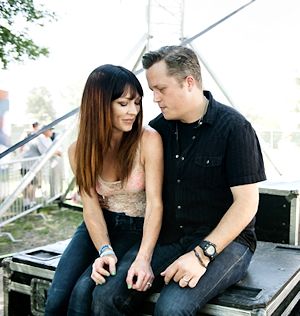 |
Cobb also recorded two albums for Drive By Truckers refugee Jason Isbell who recently topped country charts. The first, the haunted, intimate 2013 LP Southeastern has sold nearly 190,000 copies. Last year's Something More Than Free topped Billboard's country and rock charts and won two Grammys. “What really helped those albums translate to a broader audience was that the songs were really unadorned,” Isbell said. “Dave did a really good job capturing moments rather than trying to create something slick.” |
Cobb added: “I'm about making records that bring you towards the speakers as opposed to pushing you away. A lot of records now, there's so much going on, it's like getting hit over the head with the sounds.”
STAPLETON, STURGILL AND ISBELL
Stapleton, like Johnson, is a prolific writer with hits for Kenny Chesney and Luke Bryan.
He signed to Mercury with little solo success before he recorded the ragged, soulful Traveller.
Lewis was running Mercury's parent company, Universal , when they signed Stapleton.
“Cobb had a pretty big influence on the sound of Chris's stuff,” Lewis said.
“I say that because I've heard a load of demos and other records he made with another producer.”
Stapleton said Cobb was fearless.
“Production can be very polarising,” he said.
“If somebody doesn't like it, somebody else is going to love it. If you always worry about being middle of the road and making something everybody can tolerate, then you're not really doing anything.”
The success of Cobb and Stapleton with Traveller broke the Nashville dam and way beyond.
“The most important thing that happened in that entire chain was Mercury allowing Dave to do Chris's record,” Shooter added.
“Had they not, he wouldn't have had the same kind of record. What has happened with Chris is pretty much the most valuable thing in all our lives at the moment. Now people at these labels say: ‘Hey, this stuff actually makes money. This stuff wins Grammys.' Now everybody's wanting to put out records like this. Forever, all of us were chipping at a wall, so for Chris to break through to the other side is exciting.”
The jury is still out on whether Traveller will open radio floodgates for artists like Simpson, Isbell and peers.
Eclectic artists don't have to rely just on mainstream radio.
John Marks worked in terrestrial country radio and as Sirius XM's director of country programming, who now heads Spotify country department and says although “the ratings process dictates a search for homogeneity in music” by radio programmers, artists that don't fit are finding receptive audiences elsewhere.
“Their music is becoming more accepted in areas like social media and streaming, where there's less of a boundary between music types,” he said.
“As such, although mainstream stars and outsiders like Simpson and Isbell still operate on somewhat of a parallel road, it's evolving.”
Cobb is self-effacing about his role in this Nashville renaissance.
Rather than using the new album, Southern Family , to stake his claim, the record doesn't even have his name on the spine - it's credited to Various Artists .
“I'm just a facilitator,” he said.
“I don't want to take credit for anything. It's always been about the artists and making the records the best representation of the artists. I was in the right place at the right time.”
WHITE MANSIONS PREDECESSOR
Cobb expanded on his passion for southern country.
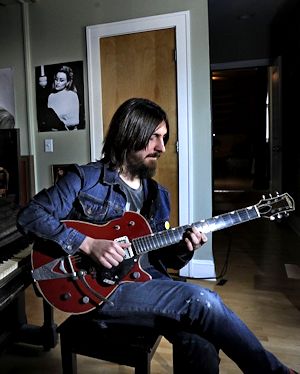 |
“I feel like I've made most of my career about passion projects, you know? Chasing down and working with Jason Isbell, or meeting Sturgill and going into the studio with him completely just because I believe in him, chasing down Chris Stapleton and making records with him.” Cobb explained. “I've always done very passion-oriented projects, and this is probably the most, in a way, selfish project I've ever done.” Cobb defied disdain for concept albums after hearing White Mansions - his inspiration for Southern Family. “It was a really great opportunity to take all my friends and people I really believed in and put them all on one album together and to kind of write about things that you know and things you grow up in,” Cobb explained. |
“ White Mansions was a concept record about the American Civil War, written by an English guy, Paul Kennerley, who had never been to America. He just summed it up so well. Everything on that record spoke to me. I've been possessed with it and I try to convert everybody to it for years. I really steal half of my tricks from that one record.
“Glyn Johns produced White Mansions . It had Waylon Jennings and Jessi Colter and had Eric Clapton‘s band, and that's always been my favorite record, the record that got me into country music. Paul just summed it up so well. Everything on that record spoke to me. I've been possessed with it and I try to convert everybody to it for years. I really steal half of my tricks from that one record.
“So it was really one of those things where it seemed a concept record was a really terrible idea, but it was a really good excuse to have all your friends together, and, luckily, everyone was excited about it, too, and said yeah. I can't believe they said yeah.
“I don't know if there's any track record on concept records selling any records. It could be the death of my career, you know? It's totally done just because it's a great opportunity to hear these stories, and what a great opportunity to get to work with people that I know and love, and then also new people that I love, too. It was really just a dream record in a lot of ways.”
So how did this disc differ from working with just one artist?
“Well, each time I walked into the studio with each of these people, I wanted it to be about them,” Cobb explained
“It wasn't about the record as a whole; it was about their personal story. And on this record are these really intimate stories, and the songs are really exposing a lot. When I walked into the studio, it was always about making you feel the story and making you hear that artist's voice. I treat that the same way when I make an album with a single artist, too: It's about them, it's not about me.
“I didn't want the record to have one run-on sound. It's really a bunch of stories that are collected into one album, and they all sound different, and they all feel different. But I think it's interesting a lot of the stories all come from grandparents. I wanted it to come from grandparents and parents and children, and things you grew up culturally with.
“I think the reason why this was called Southern Family is because the people that I knew for the record were mostly Southern, so I think that was an easy thing. Songs like Chris and Morgane Stapleton's You Are My Sunshine are so universal, you know? And the family values are universal as well. Southern music is diverse. It's not just country, it's not just bluegrass, it's all of it: It's rock ‘n' roll, it's soul, it's blues."